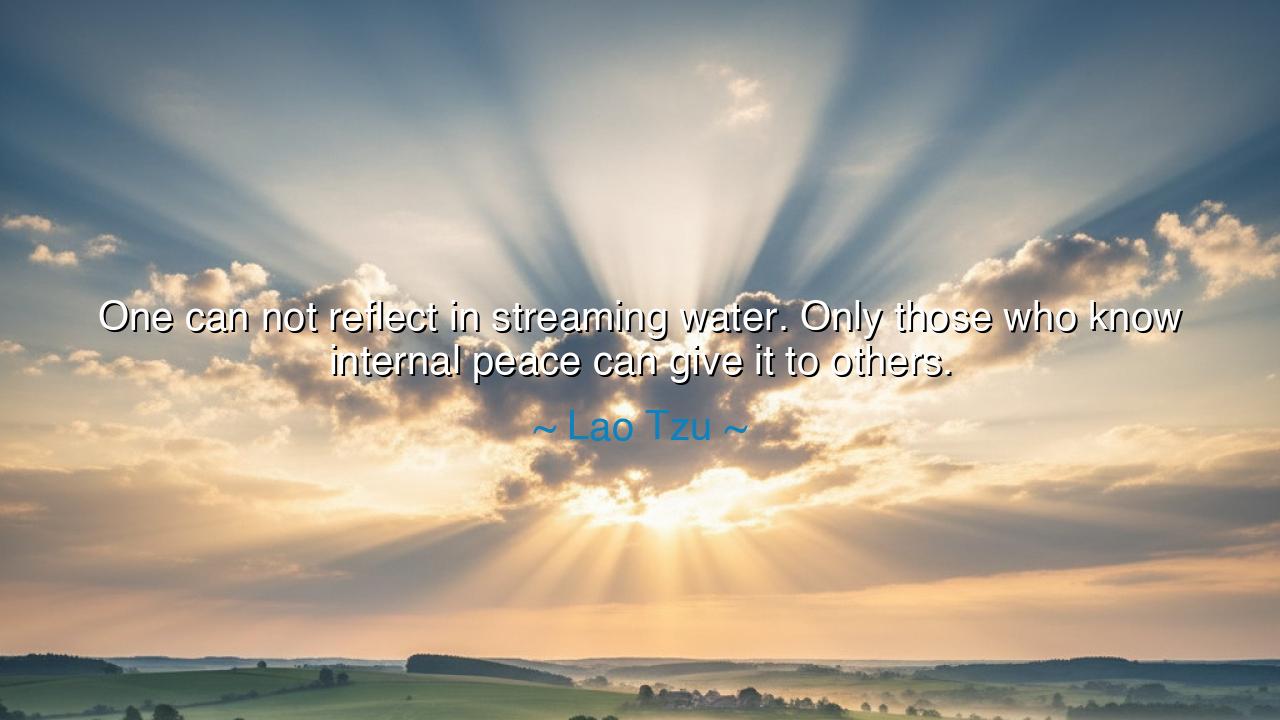
One can not reflect in streaming water. Only those who know
One can not reflect in streaming water. Only those who know internal peace can give it to others.






The words of Lao Tzu—“One can not reflect in streaming water. Only those who know internal peace can give it to others.”—speak with the quiet gravity of the Tao, a wisdom that has endured for centuries. In them is revealed a timeless teaching: the heart of man, like the surface of a pool, cannot see clearly if it is disturbed and restless. Just as rippling water distorts the face of one who gazes into it, so too does a turbulent spirit prevent the clarity needed for wisdom, compassion, and guidance. Only when the waters grow still does reflection become true.
The first image Lao Tzu gives us is of streaming water. It is alive, moving, unsettled. To peer into it is to see fragments of a face, broken and wavering. This is the soul caught in anger, worry, or endless striving. Such a soul cannot reflect reality, cannot offer clarity to others, because it is too clouded by its own motion. Just as a warrior cannot aim with a shaking hand, a leader cannot guide with a restless heart. The teaching is simple, yet profound: stillness is the foundation of wisdom.
The second truth flows naturally: internal peace is the source of peace for others. A man who is restless within cannot bring calm to his family, his people, or his world. But the one who has stilled his own waters becomes like a clear lake: he reflects truth, he nourishes life, he refreshes those who come near. Consider the Buddha beneath the Bodhi tree, who first stilled his heart before offering teachings that gave countless souls release from suffering. His peace was not inherited—it was cultivated, and from it flowed liberation for others.
History gives us another example in Mahatma Gandhi. He faced an empire, and though his people clamored for vengeance, he first mastered his own spirit. He practiced silence, fasting, and prayer, creating within himself an unshakable calm. From this inner stillness, he was able to lead millions in nonviolence. Had his spirit been turbulent, had he mirrored the rage of oppressors, his movement would have collapsed in chaos. But his internal peace became the wellspring of peace for an entire nation.
Lao Tzu’s wisdom also warns us of the danger of ignoring this law. Many attempt to bring peace while restless themselves. Parents who preach calm but live in anxiety sow confusion in their children. Leaders who cry for harmony but burn with ambition create only strife. Teachers who speak of clarity but live in disorder bring no light. Without internal peace, their efforts are like reflections in streaming water—distorted, fragile, false.
The lesson for us, seekers of truth, is this: before we can give peace, we must first cultivate it within. This is the eternal order of things. We must learn to quiet our restless minds, to still our agitated spirits, to release anger, envy, and fear. In stillness, reflection becomes true; in peace, wisdom becomes possible. Only then may we offer to others what we have ourselves attained.
Practically, this means creating habits of stillness: moments of meditation, silence, or prayer; walking slowly in nature; breathing deeply when anger rises; pausing before speaking in haste. By training the waters of the soul to settle, we make ourselves vessels of clarity. And from this clarity, we may give to others—not distorted fragments, but true peace, drawn from the well within us.
So let the words of Lao Tzu be carved upon your heart: “One can not reflect in streaming water. Only those who know internal peace can give it to others.” Seek stillness, cultivate peace, and let your life reflect truth. In this way, you shall not only find harmony for yourself, but become a source of harmony for all who drink from the waters of your spirit.






AAdministratorAdministrator
Welcome, honored guests. Please leave a comment, we will respond soon